In the mid 1980s, at the height of the moral majority, the religious right, and rampant Reaganism, an inexperienced vice cop in Los Angeles went undercover to try and bring down a veteran distributor of adult films.
His target? One specific line of video tapes: a series of films made for the notorious Avon theater in New York, a collection of movies so reprehensible that the L.A.P.D. claimed that people would throw up after seeing them.
The result was an elaborate game of cat and mouse played out between the two men over several years – with an unexpected outcome involving the then biggest name in the adult industry, Traci Lords.
The Rialto Report obtained court papers and investigative notes, and spoke to many of those involved in the events to forensically document what actually happened.
*
For previous episodes of our Avon series:
Part 1: Avon Films: The Boss
Part 2: Avon Films: The Procurer
Part 3: Avon Films: The Phil Prince story
Part 4: Avon Films: Joe Davian, The Enigma
Part 5: Avon Films: Elroy Brandy, The Shooter
*
With thanks to all those who spoke and provided information on the condition of anonymity.
———————————————————————————————–
1. Operation Blue Moon
1985. You remember it like it was yesterday, right?
It was a perplexing time – whether it was Live Aid fixing famine in Ethiopia (with tons of the resulting food swapped by the local government for Russian arms), Coca-Cola giving the world the answer to the question nobody had asked (and that answer was New Coke), or Michael Jordan being named ‘Rookie of the Year’ (whatever happened to him?). And President Ronald Reagan rewarded the Christian right for delivering him a second term by giving them their long-awaited wet dream: a big, fat commission to investigate pornography.
Ah, mid-80s porn. In some ways, not overly different from mainstream culture, with its mullets and leg warmers sound-tracked to synthesizers and drum machines, and all captured on cheap video. The Republican commission must have had a whale of a time inspecting the evidence. The principal problem for the group, led by U.S. Attorney General Edwin Meese and populated by an up-tight crew of conservatives, religious zealots, and psychiatrists, was how to define obscenity on our screens. Or rather, what on God’s earth could still be considered truly obscene in an era of unprecedented sexual permissiveness? (Note: this was the decade that gave teens ‘Blue Lagoon’ (1980), a love story depicting sex between naked cousins. Yes, they were cousins.)
The Los Angeles Police Department wasn’t in the mood to wait around for the commission’s conclusions. Their city was the porn capital of the world and they dealt with the sex film industry on a daily basis. They saw it like this: on the one hand, common, garden-variety pornography offered slim pickings for them. X-rated videotapes had started showing up in mom-and-pop stores, and no one seemed to be genuinely offended by ‘Ghost Thrusters’, ‘Romancing the Bone’, or ‘In Diana Jones and the Temple of Poon.’
But at the other end of the spectrum, deeply unpleasant material like kiddie-porn or bestiality was clearly a law-enforcement no-brainer – yet, contrary to the religious right’s pearl-clutching scaremongering, there simply wasn’t much of it in circulation to prosecute.
What the L.A.P.D. needed was pornography that was something in between the vanilla and the appalling: porn that was scandalous, offensive, maybe a little disgusting too, but porn that was nevertheless available to the masses if you really looked for it. In other words, porn that pushed the boundaries of prurience, that was more outrageous than Ginger Lynn and her buff, horizontal-jogging cohorts, but less reprehensible than actual illegal acts on video.
Some cops said that B&D films were their answer (that’s ‘bondage and domination’ to the non-cognoscenti). The problem was that most of the major XXX companies had started to branch out into bondage videos, and the result was harmless, tame rope-operas. In fact, the L.A.P.D. had already tried, unsuccessfully, to prosecute some of them, evidenced by eleven struggling cases limping through the courts involving the likes of Cal Star, Bizarre, and California Video.
The solution had to be a more radical, imaginative, and penetrating approach. And so, an undercover team was created, known as ‘Operation Blue Moon’. And instead of targeting the producers, they would target the real criminals: the sellers and the distributors of pornography in Los Angeles.
To explain: there were two types of adult film producer in the 1980s – the larger producers who did their own distribution, and independents who sold their films to a distributor. Operation Blue Moon would target the latter: it would buy material from various independent sellers to find out what videos were being placed on the market – especially the more secretive, darker margins of the market, videos that fell into the murky, gray area of obscenity that could result in successful prosecutions.
To achieve this, the L.A.P.D. set up an undercover company called Blue Moon Distributors. Of course, Blue Moon Distributors wasn’t a real company – it was just a mail drop in Pomona, CA, with no offices and no full-time staff. But to their adult film distributor clients, they were a legit new-kid-on-the-block operation that would be taken seriously.
The covert operation started in earnest in 1985.
*
2. The Target: Avon Films
The brain behind Operation Blue Moon belonged to Detective Robert Peters, a square-jawed, 16-year veteran of the Pornography Unit of the Vice Division. Peters’ credentials were impeccable: he’d participated in hundreds of investigations enforcing obscenity statutes, instructed a vice school for L.A.P.D. officers, and testified in federal court numerous times regarding obscenity.
Peters’ biggest success had come in 1982 when he’d busted a kiddie porn operation. That case had caught the newspapers’ imagination not just because of the size and scope of the enterprise (it was estimated that the criminal operation he busted accounted for 80% of all illegal and ‘untouchable’ pornography in the U.S.), but also because the kingpin behind it turned out to be an African American, well-to-do, divorced mother of five, whose children were driven to private schools in a Rolls Royce from their triplex suburban Wilshere home they lived with their grandmother. (By the way, the list of the mother’s 30,000 sex film clients was kept in her baby’s crib). It was a great story and, for a hot moment, Detective Peters was the golden boy of the California anti-pornography effort.
The problem with Peters’ new role in Operation Blue Moon was precisely his successful record and longevity: his handsome face was now recognized in every California porn distribution warehouse from Anaheim to Zamora. As a result, Peters had to stay in the shadows and get someone else to do the work, which meant finding another cop who could be the public face of Blue Moon Distributors.
Step forward Officer Steven Takeshita.
Takeshita was a Japanese-American who’d been an L.A.P.D. police officer for 11 years. S, and since May 1985, an officer in the Pornography section of Administrative Vice Division. Takeshita – whose prior experience was on a beat in the skid row area arresting masturbating males for lewd conduct in adult film theaters, and who admitted he never even looked up at the cinema screens – wasn’t an overly qualified expert. In fact, this was a big step up for him.
It was decided that Blue Moon Distributors would be run by Peters and Takeshita together: Detective Peters would be the invisible President of Blue Moon, using the undercover name ‘Robert de Paul’, while Officer Takeshita would pose as Vice President using the name ‘Steve Suzuki’, and would visit the various distributors’ locations to purchase the VHS tapes.
From the start of the operation, Peters and Takeshita had a specific target in mind: Avon Films, an obscure New York-based production company whose movies were shown in Times Square’s shoebox Avon theater. Their films had become notorious for their raw, unpolished style, not to mention sexually violent themes. Peters had first become aware of Avon in the late 1970s when the films were being exhibited theatrically in New York to great success. Peters didn’t believe that Avon films were ever shown theatrically in L.A., but when they started to appear on videotape in the early 1980s, Peters investigated and watched between 10 to 15 of the Avon films. When pushed, he remembered Kneel Before Me (1982), House of Sin (1982), Oriental Techniques of Pain and Pleasure (1983), Den of Dominance (1983), The Story of Prunella (1982), and Tales of the Bizarre (1982) before his eyes glazed over: they all blended together, he said. Vile, grotesque films that he couldn’t unsee. Peters would tell other cops that the Avon tapes were so bad he’d heard that salespeople would vomit when watching them. He admitted that other movies on the market had similar themes – a Marilyn Chambers’ double bill, Beyond DeSade (1979) / Never a Tender Moment (1979) was another of his targets – but he insisted that none were as graphic as Avon, and none were more deserving of being declared obscene. Avon represented everything that Peters had been waiting for: an opportunity for the L.A.P.D. as well as a big test. It was a chance to bring the battle against obscenity back onto the front pages of the L.A. Times.
Steven Takeshita had briefly come across Avon films too, when he had arrested a member of the public in 1984 who happened to be in possession of several Avon videotapes. Takeshita described the content as “as bad as you could imagine… featuring urination, defecation, sadomasochism, and bondage.”
So when the operation started and Takeshita went undercover with Blue Moon, it was only natural that he asked distributors about Avon films in particular. He was told that there were only two suppliers of Avon tapes nationwide: Video Home Library, operated out of New York by mobster Andrew ‘Andre’ D’Apice, and a lone Los Angeles company, X-Citement Video.
Using his nom-de-porn, Steve Suzuki, Takeshita set up an appointment with head of X-Citement Video, Rubin Gottesman.
*
3. Ruby
Rubin Gottesman was born in Brooklyn, N.Y. on August 31, 1932 to a working class, Jewish family. The clan lived out on Coney Island where teenage Ruby worked a variety of odd jobs to make spending cash, including selling ice creams on the beach in the summer. During the Korean War, he was drafted into the Army, where he worked as a cook for the troops stationed in Baltimore before serving in the Army Reserves (and returning to Coney Island to sell more ice cream during his furloughs.) He was a hard-working, family man and, in 1959, Ruby married his sweetheart in Brooklyn and they had three children.
After spending the 1960s kicking around Brooklyn doing this and that, Ruby felt aimless and wanted a change. He got into a conversation with an old friend, Norm Arno, who lived on the west coast. Norm invited him out to Los Angeles for a two-week clear-the-head break. Norm was a pornographer and a grifter with a rap sheet as long as a phone book. Since the mid-1960s, Norm had been mailing racy books and 8mm sex films through a complex network of suggestive ads in men’s magazines, anonymous post office boxes, and shadowy shell companies. He’d been busted several times – including once for offering a role in a sex movie to an attractive blonde… who turned out to be a police woman. Norm was fearless, which in the early porn business, also meant that he was always in trouble. In fact, when Ruby visited him in California, Norm had just been found guilty of 28 counts of mailing obscene material, including sending a book called ‘An Illustrated History of Pornography’ which drove the judge into a frenzy, describing what he saw as being “lewd, lascivious, indecent, filthy, and vile.”
Ruby was unphased and undeterred by Norm’s legal troubles: he fell in love with Los Angeles and was intrigued by the new porn business. In 1972, he decided on a complete change of life. He moved his family across country to California buying a house in Calabasas – and started work for Norm distributing his 8mm sex loops. It was a risky move: sure, the porn distribution business was lucrative – but you had to put up with the constant threat of being arrested, the lingering possibility of long jail terms, and mob involvement. But on the plus side, the industry was expanding exponentially throughout the 1970s as mainstream appetite for sexually explicit entertainment increased. Later, when VHS cassettes exploded, Norm went on to form one of the first video distribution companies, Video Cassette X-Rated, more commonly known as VCX, which became one of the most successful in the industry.
Ruby went to work and did well from the start: he figured out the business quickly, people liked him, and he developed a reputation for hard work, honesty, and fair dealing. In his first few years he dealt with Larry Flynt, knew the Mitchell Brothers, and delivered porn to the Playboy Mansion.
After working for Norm Arno for a few years, Ruby was head-hunted to work for a couple of other companies before forming his own company – which he called X-Citement Video. Ruby decided that X-Citement was to be one of the first ‘one-stop’ adult distributorships in Los Angeles, so-called because it would offer shipments of videotapes to all commercial outlets, from 7-11 corner stores to large adult bookshops. The business did well, and was highly respected by its customers: “Ruby was one of Vivid Video‘s first supporters,” founder Steven Hirsch commented. “We really appreciated what they were doing.”
But the success of X-Citement came with a cost, and often it was personal. Ruby was arrested and released on a semi-regular basis. One arrest in the 1970s was known as the St. Valentine’s Day bust when, along with several other prominent producers and distributors in the industry, Ruby was locked up by federal investigators. Or rather, the Feds couldn’t find him because he was away on a business trip, so they threw his wife in jail instead, forcing Ruby to return in a hurry and turn himself in to secure her freedom.
Nonetheless, Ruby survived and continued to grow X-Citement Video. He hired good staff too – including his shipping manager, Steve Orenstein, who began working for him in the early ’80s. In 1985, thanks to a merger with another company, X-Citement doubled in size and took on additional sales people. Sure, it was a business where you had to look over your shoulder more often than a paranoid meerkat, but at that moment life was good for Ruby.
And then in 1985, Steve Takeshita, using his undercover name, Steve Suzuki, called Ruby on the telephone. He introduced himself as the head of a new distribution company called Blue Moon. He said he was keen to meet Ruby and start doing business. So Ruby set up time for them to get to know each other.
The game of cat and mouse between the young cop and the veteran pornographer was just beginning.
*
4. The F.B.I. – and Operation ‘Perfect Picture’
Steve Takeshita was looking for a quick win and a speedy conclusion to the investigation, so Takeshita and his reporting boss, Detective Peters, decided to focus on four specific Avon titles: ‘Story of Prunella’ ‘House of Sin’, ‘Prisoner of Pleasure’, and ‘Kneel Before Me’, as well as a fifth non-Avon title, ‘Beyond DeSade/Never a Tender Moment’. They’d heard all were sold by X-Citement though none were widely advertised. Peters and Takeshita felt that each went beyond community standards, and thus were the best targets for their prosecution.
During the early phase of the operation, Takeshita visited Ruby six times and built up a strong level of trust. In November 1985, Takeshita made his first purchase of Avon films on behalf of Blue Moon Distributors, buying two titles from the shelves in the warehouse.
By April 1986, Takeshita had accumulated enough evidence to execute a search warrant on the grounds of obscenity, but Peters wanted more. He wanted to up the stakes: how about adding charges of interstate transportation of pornography? That would a federal case, which would be more impactful, prestigious, and rewarding.
So Peters approached the F.B.I. with an offer to collaborate. It was an rare move: the L.A.P.D. hadn’t worked together with federal authorities to crack pornography before, but the F.B.I. were interested. They’d just started their own investigation into smut so this could be a slam dunk all around: all they had do was to get X-Citement Video to ship the Avon tapes to another state, and then they could nab Ruby quicker than you could say ‘Beverly Hills Cox’. The L.A.P.D. would be able to celebrate an obscenity conviction, and the F.B.I. could take a high-profile win for stopping the distribution of filth across state lines. So in 1986, Operation Blue Moon merged with the FBI investigation to form a new operation called ‘Perfect Picture’.
Hawaii was selected as the state to which Avon tapes would be sent. The reasons were both legal and pragmatic: prior experience indicated that adult film distributors weren’t as suspicious of a Hawaii location because that state didn’t have an existing obscenity law. In fact, Hawaii had recently ruled a state obscenity law unenforceable. In addition, the F.B.I. already had two local undercover operators in Hawaii who knew the area well. Takeshita’s cover story was that he was importing the tapes into Hawaii for the Japanese businessman trade.
For this new phase of the operation, Peters would remain onboard as Takeshita’s immediate supervisor, but step down from being the titular head of Blue Moon Distributors. Takeshita would assume the role of sole President, and a Hawaiian FBI Special Agent Nellie Magdaloyo, using the name ‘Nellie Tamayo’, would become Vice President of Sales in charge of the Hawaii office. They had business cards and a company check book made up with a physical office address at Suite 3162, 7150 Kalakaua Avenue in Honolulu. Once again, the office was fictional – the address was nothing more than a mail drop.
The F.B.I. had one non-negotiable requirement for the new operation: they insisted that all of Takeshita’s interactions with Ruby and the staff at X-Citement be recorded. It was no longer good enough for Takeshita to write up field reports of his meetings after he returned to the L.A.P.D. precinct. From now on, all phone calls would be recorded using a regulation suction microphone, and in-person conversations had to be recorded on reel-to-reel tape using two stereo microphones for which the hardware, a small tape recorder, would be carried inside a briefcase. (They chose to hide the recording device in this way because some distributors had started to pat down new visitors to their warehouses, ruling out an external body-wire microphone.)
On June 11, 1986, Takeshita, posing as Steve Suzuki, and FBI Agent Magdaloyo visited Ruby at X-Citement video at 11 o’clock in the morning. Takeshita told Ruby that Blue Moon Distributors was expanding and introduced Magdaloyo as his new vice president in Hawaii in charge of sales. Ruby said that shipping videotapes to Hawaii would be no problem. He then gave Takeshita and Magdaloyo a tour of the X-Citement warehouse, during which they met Ruby’s shipping manager, Steve Orenstein.
Three weeks later, on July 3, 1986, Takeshita visited X-Citement again, with his tape recorder on in his briefcase. This time he met with Orenstein in the warehouse, and selected two Avon titles, ‘The Story of Prunella’ and ‘Prisoner of Pleasure’, as well as ‘Beyond DeSade’ / ’Never a Tender Moment’.
Orenstein completed an invoice for the tapes, and agreed to send them to Blue Moon in Hawaii. Takeshita paid for the tapes with a Blue Moon check. Then the L.A.P.D. and F.B.I. celebrated. The fix was in.
*
5. The Traci Lords scandal breaks
The adult film industry’s where-were-you-when-Kennedy-was-shot moment happened just a couple of weeks later on July 17th, 1986 when the Traci Lords scandal broke.
Traci Lords had been brightest star in the porn galaxy, every tape she made out-grossing the previous record. Not that Traci was notable for the quality of any particular film in her catalogue mind you, rather she was famous for the over-the-top, unabashed, high energy emoting and enthusiasm she poured into her sex scenes. Her three-year career had included numerous magazine spreads, including a Penthouse centerfold, and over seventy starring roles in shot-on-video XXX titles, such as One Hot Night of Passion (1985), Tailhouse Rock (1985), and The Adventures of Tracy Dick: The Case of the Missing Stiff (1985). Not content with just starring in the films, in an unprecedentedly bold move, Traci had even formed her own production company, TLC – the Traci Lords Company – that had already shot starring vehicles with her in Tokyo and Paris.
And then it was discovered that Traci was underage: she had entered the adult film industry using a fake birth certificate to conceal that she was two years younger than the legal age of eighteen when she started.
Overnight, her videos, which had sat on prime shelves of every adult bookstore across the country, became child pornography. Those selling and distributing them were now child pornographers, subject to aggressive prosecution under state and federal laws on either felony or misdemeanor charges. The sex industry reacted in the manner of a naughty schoolboy caught stealing the principal’s apple: it had to get rid of all evidence of the offending object overnight. Suddenly there was a rush to pull anything from store shelves that had Traci Lords’ name on it: posters, magazines, and videos. Especially videos. Industry giant VCA took no chances, destroying all videos completely before turning around and claiming they’d never had any in the first place.
The financial burden of the scandal was borne by the middlemen, the distributors. They had two problems on their hands: firstly, the Traci Lords scandal put them in a financial hole. The video stores simply returned Traci Lords videos to them in exchange for a credit on their next purchases. But the distributors couldn’t return the same tapes to the production companies because the producers were long gone, having closed down companies, shut up shop, and disappeared into thin air in a matter of days. Distributors suddenly found themselves having to refund their clients to the tune of thousands of dollars without any recourse.
Their second problem was the physical tapes, the glaring evidence that Traci Lords was an underaged sex performer: what to do with the thousands of box covers and VHS movies that sat in their warehouses?
Ruby was involved in this disaster like everyone else. He’d been selling Traci Lords titles to his network of client since the underage actress had started in the business. And just like everyone else, he’d been completely unaware and unsuspecting that Traci was only 16 or 17 years of age when she made the movies. So just like everyone else, Ruby sent instructions to his clients for the tapes to be returned.
*
6. X-Citement Video reacts
Susan Marie Ringier had worked for X-Citement as a sales rep for four years.
Ruby had first met her at a trade show and offered her a job. Susan was a hard worker with a detailed knowledge of the adult film industry, but she’d become dissatisfied when her previous employers started focusing on big budget Hollywood films. Ruby offered her a new start, and she gratefully grabbed the opportunity with both hands.
At X-Citement, Susan had her own clients, a wide network of sex shops, bookstores, and video retailers. It was a simple deal: they called her on the X-Citement 1-800 number, she advised them on the hottest product, sent it to them, and then received commission based on the volume of tapes she sold. She did well, so Ruby had promoted her to overall sales manager. Now she coordinated the orders with the warehouse, kept up-to-date on the parts of the country that X-Citement wouldn’t ship to based on local ordinances or election crack-downs, and shielded Ruby from queries he didn’t have to deal with. Her main working relationship was with Steve Orenstein, shipping manager of the warehouse.
Susan remembered reading about the Traci Lords story in the Los Angeles Times: “It was all over the news – and it was all anyone was talking about,” she remembered. “Everyone, but everyone, sold Traci Lords tapes. Traci was the number one name in the business so everyone made money. And now everyone was brought to their knees because of her.”
As for X-Citement Video’s response, Susan remembered Ruby reacting to the story instantly: “Ruby told me we had to call all our customers and tell them to pull the tapes off the shelves. Then he told me to send out letters to make the same point. There were a lot of individual Traci titles, over 80, so I prepared a list of her videos to work from. The warehouse guys took all the remaining stock out of the warehouse. And that hurt us financially… Each tape was selling for $50 or more, and we had thousands out there. All traces of Traci were removed from the company.”
One video store owner who Susan contacted was Chester Frank Snyder, who used to operate under the name Dan Christian. Snyder lived in Dallas, TX, where he’d owned and operated the Talk of the Town video store for six years. Snyder bought all his stock from X-Citement Video. In fact he knew and trusted Susan Ringier to such an extent that, rather than picking out and ordering specific titles, he just relied on Susan to send him the best of the new releases each month.
Ruby liked traveling to Texas and would often visit Snyder at his Talk of the Town store to collect the monthly payment due to X-Citement Video in person. When Ruby visited Snyder in August 1986, he found Snyder to be uncharacteristically unhappy. Snyder told Ruby that he’d had a lot of Traci Lords videos in his store. He’d complied with Ruby’s instructions and had pulled them all from the shelves, but now he wanted to know how Ruby was going to compensate him for these items that he’d already paid for.
Ruby was used to the question: all his clients were asking him the same one. He assured Snyder that he’d make him whole by crediting Talk of Town’s account. Snyder was placated. Ruby was resigned. It was going to be a shitty year for the business.
One more thing, Snyder said as Ruby prepared to leave. What was he meant to do with the fucking tapes themselves? Snyder had sealed them in a few huge boxes, but he wanted them off his premises completely. What if he was raided by the cops?
Ruby sighed. Sometimes it sucked providing good quality customer service.
No problem, Ruby said. Just put the boxes in the back of his station wagon, and you’ll never have to see them again.
*
7. Takeshita places the big order
As luck would have it, the day the Traci Lords scandal broke was also the next time Officer Steven Takeshita visited Ruby at the X-Citement Video offices.
Takeshita was there to bolster the evidence of the case by buying a bigger selection of Avon videotapes. On his last visit to X-Citement Video, he’d bought two Avon titles, ‘The Story of Prunella’ and ‘Prisoner of Pleasure’. This time he was going to push the boat out. He’d worked out that there were at least 16 Avon titles in total, and so Takeshita told Ruby he wanted two of each – a total of 32 tapes – to be shipped to Blue Moon in Hawaii.
Ruby had always been an affable, happy, relaxed character. But on this visit, Takeshita noticed that Ruby was nervous, so he asked him what had rattled his cage.
“It’s this Traci Lords story that just hit the fan today,” Ruby said. “It’s killing us. We’re all going to lose a pile of money on the tapes we have to trash.”
It didn’t stop there either: Ruby told Takeshita that another downside was that all the distributors were bracing themselves for the more raids from the cops – a pain in the ass on top of everything else as it would result in additional fallout and paperwork.
The cat taunted the mouse: Takeshita asked Ruby what he was doing about it. Ruby said he would have to destroy the Traci Lords tapes. Furthermore, he told Takeshita he’d moved all the Avon tapes out of the X-Citement warehouse. “That’s the stuff that the cops would be most interested in,” Ruby said, “so I’m hiding it all until the heat dies down.”
This last bit of news dismayed Takeshita. If he couldn’t get Ruby to ship his new order of Avon tapes to Hawaii, the obscenity case would be under threat. He silently cursed: this bullshit, unrelated, Traci Lords story might just have jeopardized the whole ‘Perfect Picture’ operation.
Ruby put his mind at rest: “Relax,” he said. “The Avon tapes are all in the garage at my home in Calabasas. Anything you want to order, we’ll send you in the same way.”
Reassured, Takeshita turned to Steve Orenstein, Ruby’s trusted shipping manager, and placed an order for the full set of Avon tapes. $35 per tape. 16 titles. Two copies of each. All to be shipped across state lines to Hawaii.
As Takeshita left, Ruby offered some parting advice: “Best not sell those Avon tapes in California right now. There’s too much heat. Just wait until all this Traci Lords publicity has died down, then you’ll be fine,” he said.
The whole meeting was recorded as always with the microphone hidden in Takeshita’s briefcase.
The end of the operation was in sight. Now the L.A.P.D. and the F.B.I. just had to wait for the U.S. mail to do its thing. As soon as the Avon consignment arrived in Hawaii, Operation Perfect Picture would have its complete set of evidence.
*
8. Operation Perfect Picture waits… and waits
The operation waited. And waited. But the problem was that the big box of allegedly-obscene Avon tapes didn’t make it to Hawaii. At least, not all of it. Small parts of the order arrived in stages over the course of August and September 1986, but by mid-September, two months after the order had been placed and paid for, the Hawaii office of Blue Moon was still eleven titles short.
These videotapes were key evidence, so Takeshita had to return to X-Citement Video and find out what was going on. In fact, Takeshita visited Ruby several times over the remainder of the year to demand an explanation: each time, Ruby was apologetic and promised to send the remaining Avon tapes as soon as he could. The trouble, he explained, was that his Avon supplier had gone AWOL, and he was having difficulty finding an alternative source. Ruby joked that existing copies of the Avon films were becoming collector’s items, such was their scarcity.
Peters and Takeshita were concerned, not to mention their F.B.I. partners. Had Ruby worked out that Takeshita was an undercover cop not sending the rest of the tapes for that reason? Takeshita didn’t think so. He believed Ruby’s story and felt he was doing his best to get the tapes for them. He knew Ruby had made several trips to other suppliers in New York and Texas to try and find a new Avon source. But he also knew he had to keep the pressure on him to come up with the goods or else he wouldn’t have the strongest case.
As for Ruby, he was feeling the pressure too, spooked by the two forces that governed his business: he was losing money from the Traci Lords debacle and her unsellable tapes, and he feared that his business could be busted any moment. He started being more cautious. One time Takeshita visited X-Citement Video, Ruby surprised him by suddenly patting him down rigorously, clearly looking for evidence of a wire. Fortunately for the law enforcement operation, Ruby ignored Takeshita’s briefcase that was carrying the recording equipment. Takeshita was surprised by the incident – and insisted to Detective Robert Peters, his L.A.P.D. boss, that his next trip to meet with Ruby had to be without a microphone. On that visit Takeshita made a casual play about opening his brief case in front of Ruby to demonstrate the lack of surveillance devices.
Takeshita’s actions smoothed over any suspicions that Ruby had, but the truth was that both sides were frustrated: Operation Perfect Picture had stalled as they still hadn’t been sent all the Avon title that they needed to make their case as strong as possible, and Ruby feared for his future as a result of the money he’d lost over the Traci Lords disaster.
Then Ruby took a step that changed his life – and the lives of all those around him.
*
9. Ruby’s Mistake
It all happened on February 5, 1987, when Takeshita returned to X-Citement Video to get the latest update from Ruby on the missing Avon tapes.
Ruby said he had mixed news. He’d just got back from Texas, but his sources there hadn’t gotten their hands on any more Avon product yet. However, he’d identified a New York company called G&A which promised they could supply him with Avon films very soon.
Takeshita had heard this story before and was tiring of it. But then Ruby suggested something else: what about the Traci Lords tapes, he said. He had all of them. Several copies of each, in fact. And they were all stored right there, at the X-Citement Video offices.
Takeshita was surprised: hadn’t the Traci tapes all been destroyed in the immediate aftermath of the breaking news story?
Ruby explained: in the weeks and months after the Traci Lords case blew up, he’d continued to receive a whole mess of Traci tapes, returned on credit, from his clients. Ruby said he didn’t know what to do with them all: he was reluctant to destroy them because they were worth a lot of money. But they were difficult to shift too. Was Takeshita interested?
Takeshita couldn’t believe his luck: the Avon investigation was going nowhere, but now this? The Traci Lords affair wasn’t related to obscenity, but it was something bigger and more serious: child pornography. And the whole thing had just fallen into his lap.
“Sure,” Takeshita said, trying to stay calm. “I’ll take a look at what you’ve got.”
Ruby instructed Steve Orenstein to take Takeshita upstairs and show him the Traci Lords tapes.
To Ruby’s surprise, Orenstein declined, saying that the Traci tapes were illegal, and he didn’t want to get involved.
The room fell silent for what seemed like ages. Takeshita looked at Ruby. Ruby glared at Orenstein. And Orenstein tried hard to look at no one at all.
Eventually Ruby broke the silence. He nodded Takeshita towards the stairs, and took him up to a second-floor room where the Traci Lords tapes were stored. There in boxes were 49 different videotapes all featuring Traci Lords.
Takeshita pushed his luck. He asked if Ruby knew which tapes were made when Traci had just begun her pornography career when she was 15 years old. Ruby replied that ‘Lust in the Fast Lane’ and ‘Tracie Lords’ were two of her first movies. Takeshita asked to see them, and watched as Ruby pulled out the two titles from among the collection of films.
But Takeshita’s questions had made Ruby nervous. So Ruby ushered Takeshita out of the room, locked it, and led them back downstairs to the office.
Takeshita continued to push: “How much do you want for them? And will you ship them to Hawaii?”
Ruby replied: “There are 49 tapes. You can take them all for $1,000. Cash only. No C.O.D. or check because I want no record of this. And I’m not sending them to Hawaii. That’s too much of a risk.”
Takeshita feigned deep thought.
Ruby continued. “And if you get arrested, or have any encounter with law-enforcement, you say nothing about where these tapes come from. This conversation never happened. I’m not trying to make a profit here. I just want to get the tapes off the premises.”
Takeshita thanked Ruby, and left X-Citement Video saying he needed to check his finances and would call the following day.
*
10. Operation Picture Perfect just got bigger
Back at the L.A.P.D. precinct, Takeshita and Peters were giddy with surprise.
Without their suggestion, Ruby had offered to incriminate himself in the highest profile porn case of the decade. They informed the F.B.I. and decided to proceed with both cases simultaneously – they wanted to see if they could bust Ruby on charges related to underage distribution of pornography as well as the Avon obscenity case.
The next day, on February 6, 1987, Takeshita called Ruby and told him he’d take the Traci Lords tapes. Ruby said that the package was ready to be picked up, so Takeshita headed over X-Citement Video. When he arrived, Ruby brought out the boxes and helped load them into Takeshita’s car. Takeshita paid Ruby $1,000 in cash for the tapes. Ruby joked that Takeshita had better be careful not to sell the tapes to any undercover cops. He told Takeshita that it made sense to sell the tapes in Hawaii, because “they don’t do prosecutions there.” Ruby then gave Takeshita directions to the nearest UPS office, so that he could ship them to Hawaii. The whole meeting was recorded on the device inside Takeshita’s briefcase.
Takeshita returned to the L.A.P.D. precinct where he and Peters opened both boxes and checked the content: each tape featured Traci Lords, and was made before she had reached her 18th birthday.
A week later, Ruby called again. On February 13, 1987, Ruby told Takeshita he had 56 more Traci Lords tapes available for another $1,000. Takeshita again asked Ruby to ship them to Blue Moon Distributors in Hawaii. Ruby again refused: “If you ship Traci tapes, knowing that she was a minor, that would mean you’re knowingly shipping child pornography interstate. Knowingly doing it. That’s bad. If you get caught doing that, they’ll put you away forever and throw away the key,” he said.
Once again Takeshita pinched himself: now he had Ruby admitting, on tape, that he knew the consequences of what he was doing. Takeshita’s only problem, the only problem of the L.A.P.D. and the F.B.I., was that they couldn’t bust Ruby yet because they wanted to get the rest of the Avon tapes as evidence for the obscenity case.
So they waited. Takeshita kept Ruby warm with regular calls and visits, and on occasion he was repaid handsomely. Such as on April 28, 1987, when Takeshita visited X-Citement Video and met with Ruby and his son, Howard Gottesman. Ruby offered him eight more Traci Lords tapes, but Takeshita said he had problems getting his first purchase of Traci Lords tapes to Hawaii, and so he was only interested in buying more if Ruby would ship them to Hawaii directly. Ruby’s son, Howard, had a solution: he suggested that X-Citement could separate the tapes from the box covers and ship them to Hawaii separately to avoid alerting the authorities, since a shipment of unlabeled cassettes wouldn’t draw attention. All Takeshita would have to do was reassemble the components after they arrived in Hawaii. Takeshita agreed to the idea, and bought the consignment.
A couple of days later, on April 30, 1987, the FBI mail drop in Honolulu, Hawaii that served as the undercover address for ‘Blue Moon’, received a box containing the eight Traci Lords tapes ordered by Takeshita. The tapes were: ‘Sex Shoot,’ ‘Aroused,’ ‘Sweet Little Thing,’ ‘Harlequin Affair,’ ‘Screaming Desire,” “Joys of Erotica, Series 2,” and “Pleasure Productions, Volume X”. Now they had Ruby on two crucial counts, not only dealing in child pornography but shipping it across state lines.
Then finally came the moment the L.A.P.D. and the F.B.I. had been waiting for: on May 12th, 1987, Ruby called Takeshita to say he’d finally received two of each of all the Avon tapes, and he would send them to Blue Moon in Hawaii if Takeshita still wanted them. The tapes were sat in the X-Citement Video warehouse. Takeshita thanked Ruby, and told him he’d be over shortly. It was the last time Ruby spoke with Takeshita.
A search warrant was drawn up quickly. Law enforcement moved in and raided X-Citement Video.
Rubin Gottesman was arrested for distributing child pornography and for selling obscene material.
*
11. Ruby in court
It took two years for Ruby’s case to come to court, by which time he’d already endured more tragedy.
At the end of 1988, an abandoned rental Cadillac was towed to a West Los Angeles police garage where it sat for a couple of weeks. When the rental car agency went to pick it up, they opened up the trunk and found the body of a badly beaten-up young man. The corpse turned out to be Howard Gottesman, Ruby’s son.
Did the murder have anything to do with the porn industry? Was it linked to Ruby’s business at X-Citement Video? Nobody was saying, but it was a warning, if any was needed, of the dangers of doing business in the porn industry.
Ruby was inconsolable: a reward was announced but the crime remained unsolved.
Three months later on April 12, 1989, the court case started, and it focused solely on Ruby. He was charged with distributing obscenity and child pornography, and with violations of the federal Racketeer Influence Corrupt Organizations Act, or RICO for short. Ruby was represented by, among others, prominent First Amendment defenders Stanley Fleischman and John Weston.
Susan Ringier, the trusted sales rep whom Ruby had recruited to work for X-Citement, was granted immunity in return for turning state witness.
The evidence consisted of the Avon tapes (‘Prisoner of Pleasure’ was singled out for particular attention), the Traci Lords tapes, and mountains of shipping packages, invoices, copies of checks, and wire recordings of conversations. Witnesses included several of X-Citement Video’s clients, as well as one Patricia Briceland, formerly Kuzma: Traci Lords’ mother, who testified about the underage porn star’s upbringing and their turbulent relationship.
The court case proved to be a circus, alternately comic (the judge spent an inordinate amount of time pondering his own feelings towards videos depicting urination), grotesque (Patricia Briceland was called upon to inspect different stills from her daughter’s sex films in order to offer her opinion on Traci’s age based on baby fat and hair color), and serious (Ruby faced 30 years in prison and a $300,000 fine.)
On May 4th, 1989, the judge returned his ruling on the obscenity case – and it was good news for Ruby. He concluded that the Avon videos did not violate community standards in an area as diverse as Los Angeles: “There is stuff out there which is apparently accepted by the community which is far more morbid and shocking,” he said.
For Takeshita and Peters, it was a humiliation. First Operation Blue Moon, and then Operation Perfect Picture, had spent a total of four years targeting obscenity in general and Avon films in particular. They’d lost, and this result set a precedent and sent a clear message: L.A. sex film companies now had the confidence that what they were doing was protected by the law, and they were free to continue.
Six weeks later, on June 15th 1989, the cops won the second battle: Ruby was found guilty in the Traci Lords case and convicted on two counts of distributing child pornography and one count of conspiracy.
Ruby pleaded for leniency: “My life has probably been the worst it’s ever been the last three years,” he said. “Please don’t send me to jail.”
The judge felt differently: “You opted for profit over restraint by distributing these videos,” he said. “You lack the fiber or the character to say, ‘I won’t participate in that kind of thing.’” The judge sentenced Ruby to a year in jail, three more years’ probation, and a $100,000 fine.
After his conviction, Ruby appealed to the Ninth Circuit Court of Appeals, which ruled that sections in the Protection of Children Against Sexual Exploitation Act of 1977, which required that Gottesman ‘knowingly’ trafficked in child pornography, were unconstitutionally vague. So Ruby’s conviction was reversed.
It was not a long-lasting victory. The government appealed the ruling and took it all the way to the U.S. Supreme Court. In November of 1994, the high court voted by 7-2 to reverse the lower court and found Ruby guilty all over again. (Incredibly, the two dissenters from the ruling were the conservative Justices Antonin Scalia and Clarence Thomas.)
Ruby had won a victory for the adult industry, but paid the price in the Traci Lords case. In 1997, over ten years after the Traci Lords scandal, Ruby turned himself in, and served nine months in federal prison in Fort Worth, Texas, over 1,400 miles from his family and home. Another effect of the conviction was that he wound up on the national Sex Offender Registry for his offenses, something that he remained bitter about for years.
*
12. The Aftermath
Without Ruby at the helm, X-Citement Video struggled. In his absence, the IRS claimed X-Citement Video had underpaid its taxes, so they swooped in and took anything they could find – furniture, stock, even company cars. Ruby’s son-in-law tried to assume control, but by all accounts, only made matters worse.
Meanwhile, Ruby’s former employee, Steve Orenstein, was doing well. Back in 1989, Ruby had offered him a partnership in a video production company that Ruby wanted to set up. Orenstein wasn’t interested at first, but Ruby was persuasive, and eventually the company was launched. Orenstein eventually left that partnership in early 1993 to found Wicked Pictures on his own, a hugely successful adult film production house which he still owns to this day.
As for Officer Steven Takeshita, his undercover obscenity work with Operation Perfect Picture yielded some success when he secured the conviction of Andre D’Apice for shipping the films Dominatrix Without Mercy (1976) and Waterpower (1977) to the Blue Moon address in Hawaii.
Takeshita hit the news again in the mid 1990s, when he was one of four police officers who posed as Japanese businessmen in a sting that led to the arrest of Hollywood madame, Heidi Fleiss. He appeared in a covert video recording with four women at the Beverly Hilton hotel – a meeting set up by Fleiss. The videotape showed the undercover officers talking to a group of half- dressed women. Takeshita was the one who first propositioned sex to one of the alleged prostitutes.
Takeshita went on to investigate online pornography in the early days of the internet (“The only difference between what we were doing after the start of the internet and when I used to go undercover was that I didn’t need to leave the office,” he said) and was described in the newspapers as “the undercover enemy number 1 to the legions of porn merchants who make Los Angeles the nations smut capital.”
*
Epilogue
When Ruby was released from jail, he tried to get X-Citement back on its feet again, but was unsuccessful. So he wound up taking a job at an adult bookstore in Bakersfield, California before going to work as the assistant to the owner of Cinderella Distributors for six years. It was a sad, far cry from his position as one of the main players in the industry for over 20 years. In 2001, his wife and life-long companion, Barbara, passed, and by 2006, Ruby had returned back to Los Angeles and retired. He eventually moved into an assisted living facility in Hollywood.
Ruby died on May 11, 2019, at the age of 86. The cause was multiple inoperable cancers brought on by non-Hodgkin’s lymphoma.
Ruby’s story is a sad and tragic one – for just about everyone. Knowingly selling – and thereby profiting from – videotapes featuring an underage performer was undoubtedly foolish, immoral, wrong, and illegal. No matter that he was trying to keep his business afloat. But it is still remarkable that Ruby was the only person found guilty in a court of law of any offense relating to the Traci Lords affair. There were no repercussions for the film producers who made many films starring her. No consequences for the industry who made money from her for several years. And no slap on the wrist for the person at the center of the affair, the performer who fraudulently claimed she was years older that she was and took money from companies as a result: she was underage after all, and therefore in the eyes of the law, not to mention woke after-timers, she must be treated as one completely without responsibility. Ruby lost his company, his livelihood, and his future. And was society better for his loss?
After his passing, his daughter Gail remembered, “He told me when us kids were little that we had nothing to be ashamed of; there was nothing wrong with what he did, and that it couldn’t be compared to all the killing and murder that was on television which was worse. We grew up believing that everybody had the right to watch what they wanted to watch and read what they wanted to read.
“We knew what he did, and he was proud of it and he fought for it and he believed in the First Amendment and he loved the industry.”
*
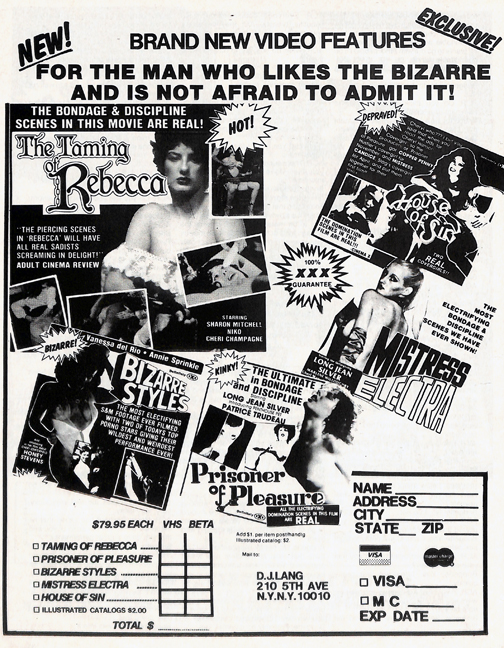
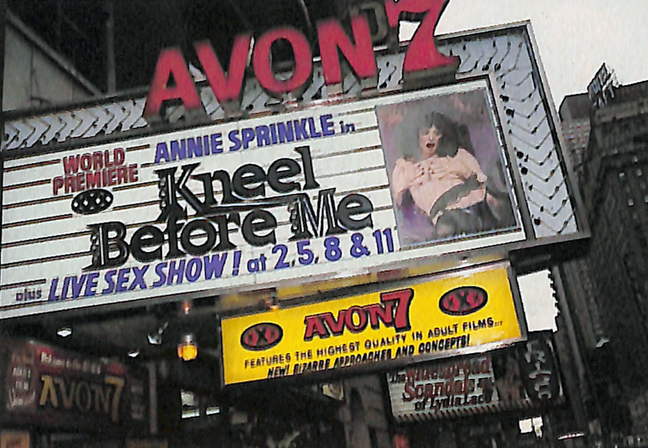
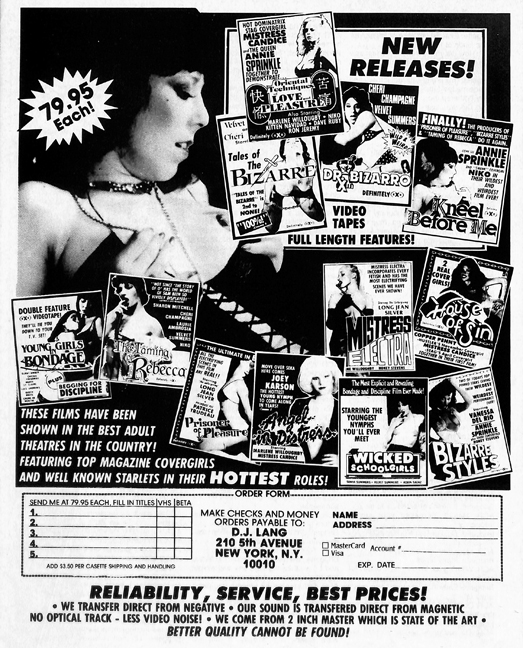
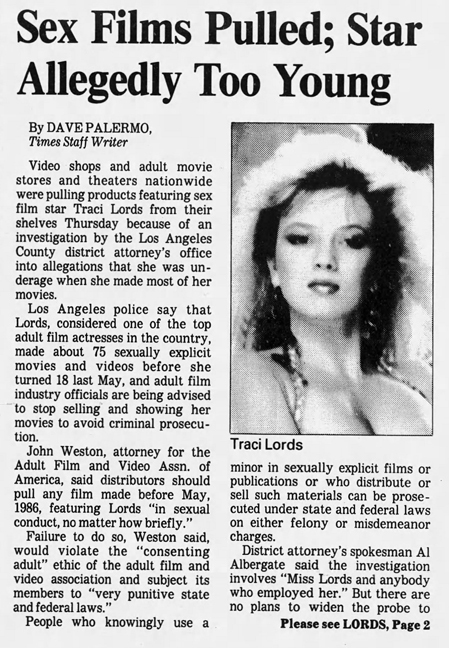

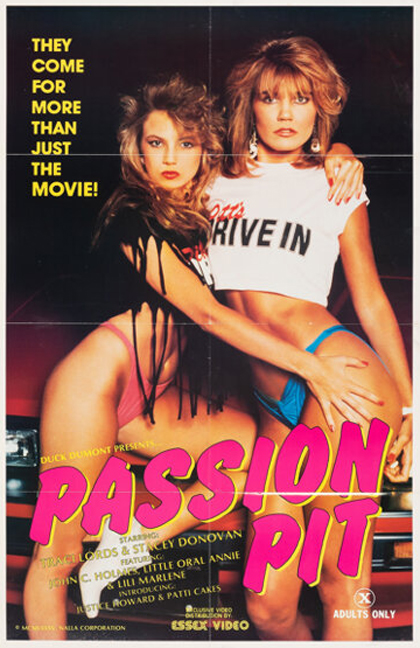
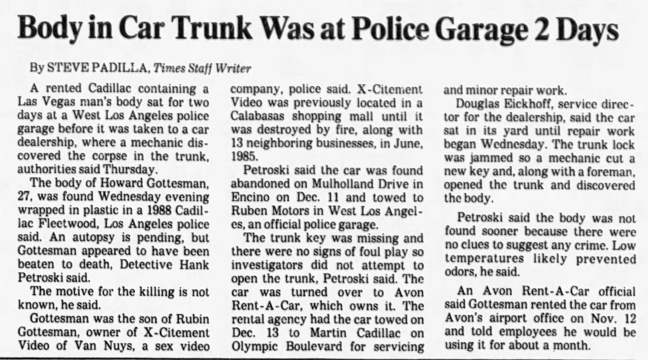
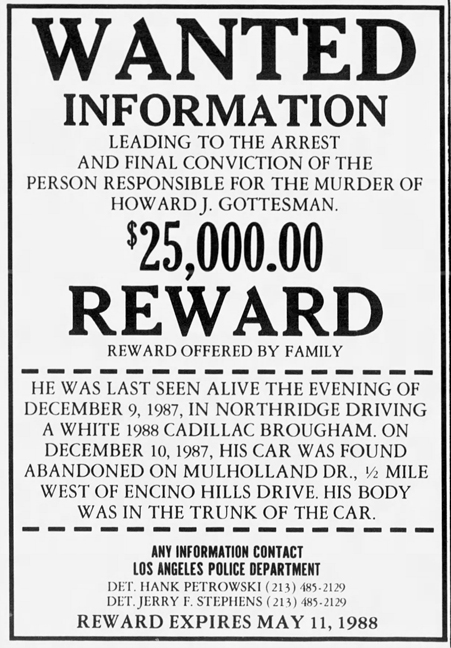
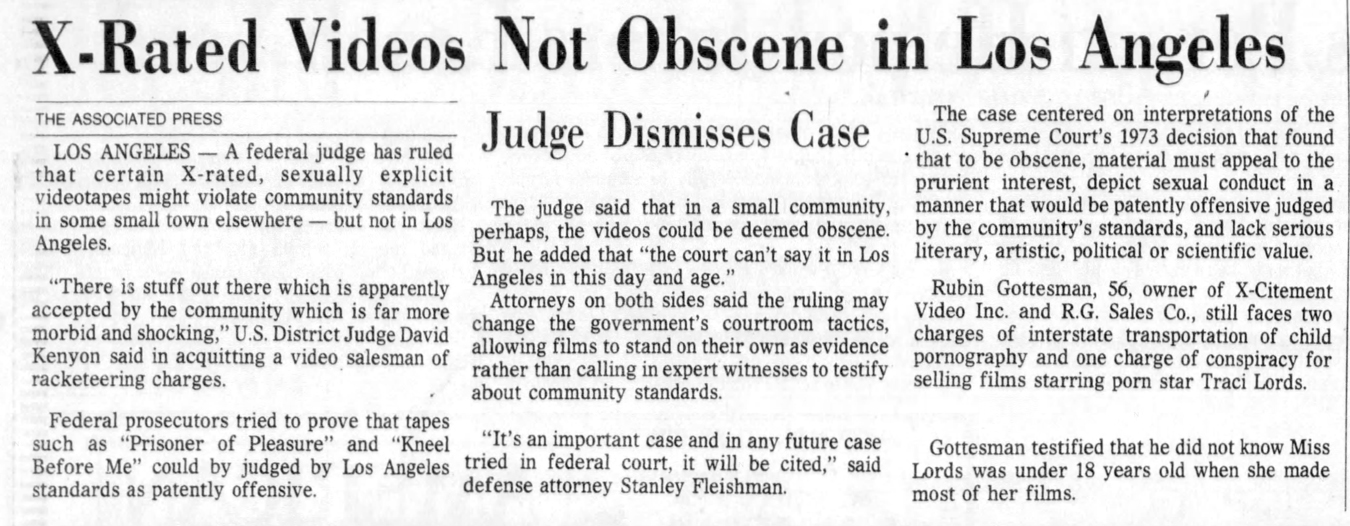
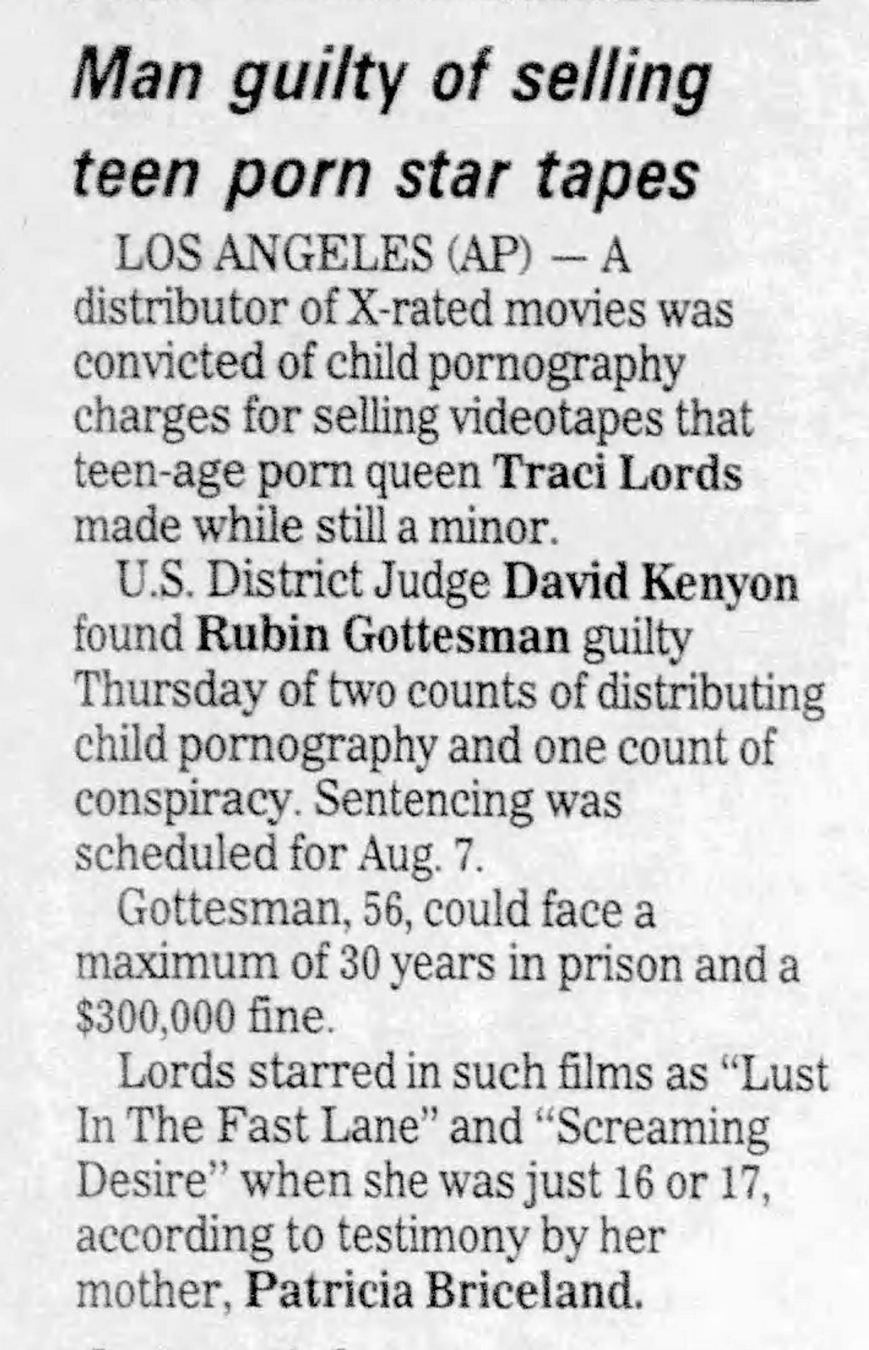


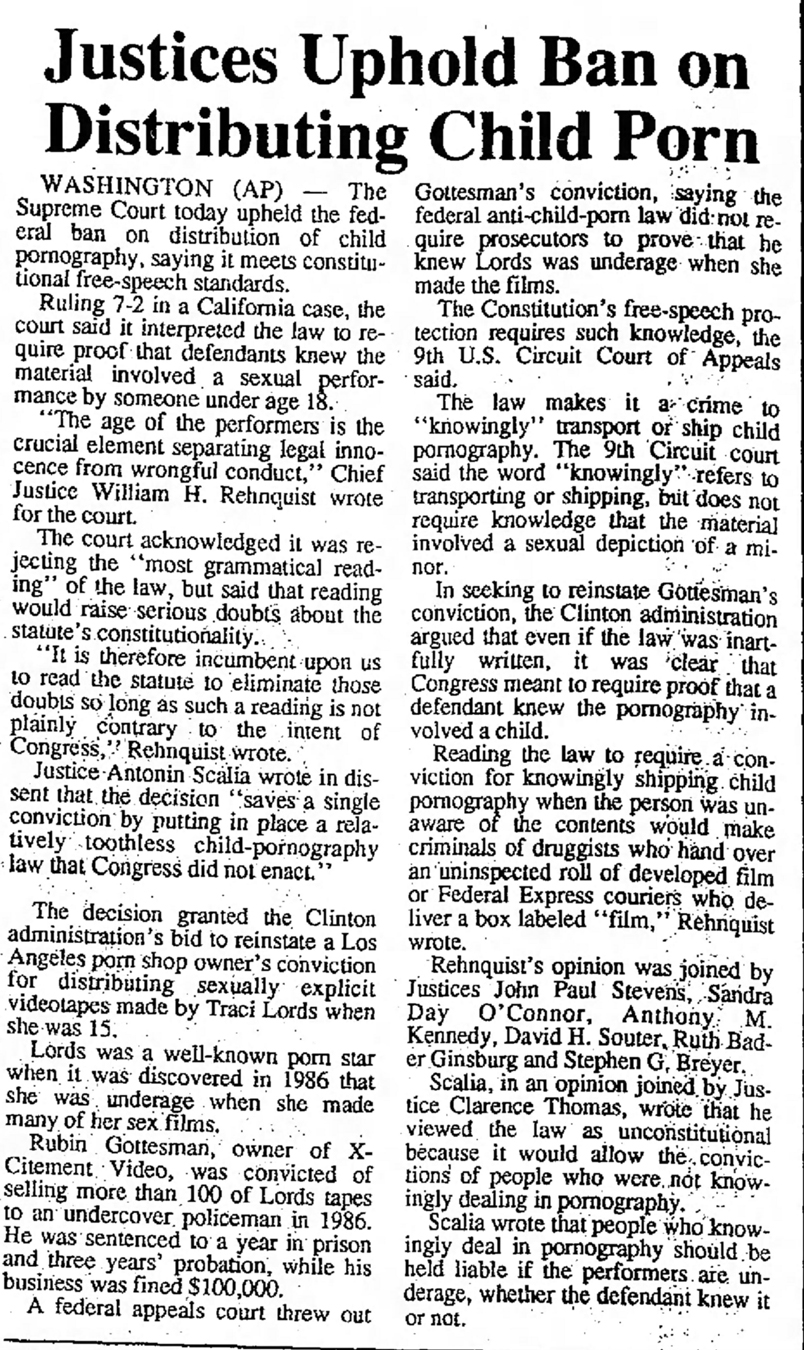
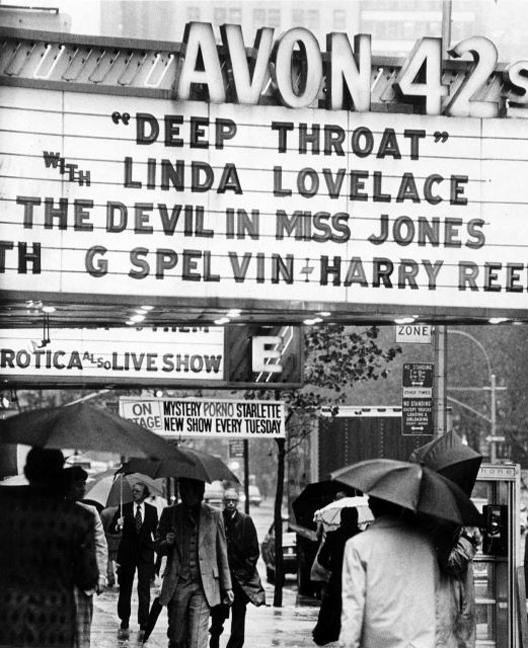
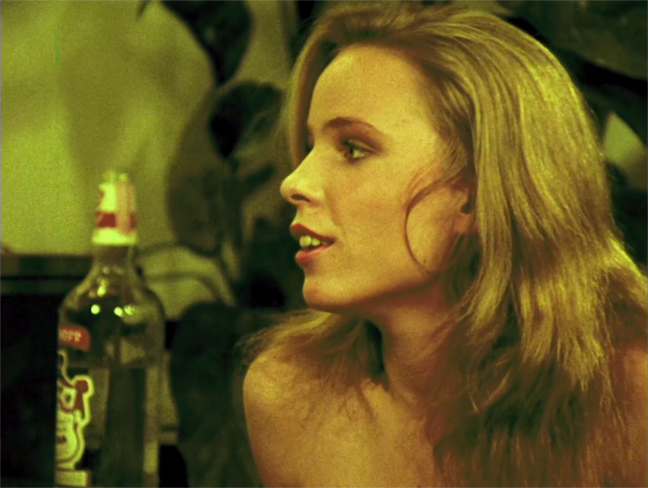
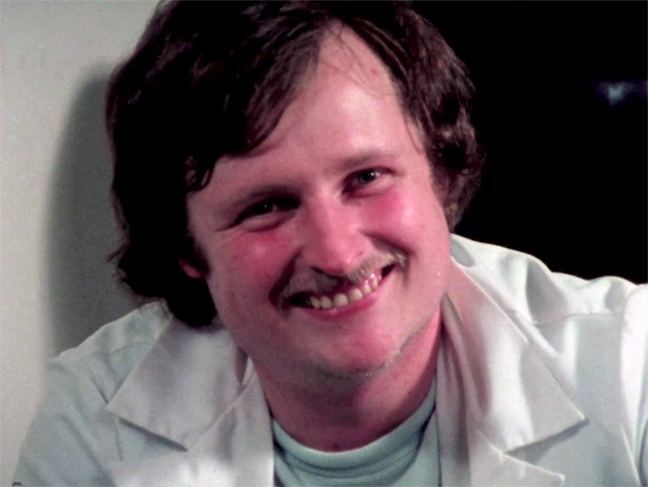
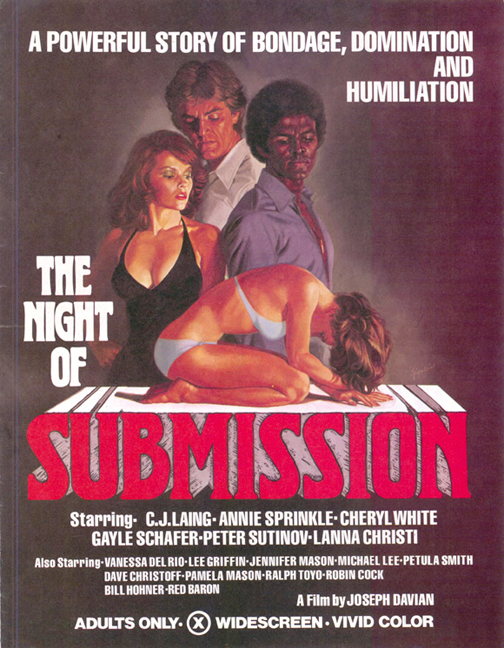
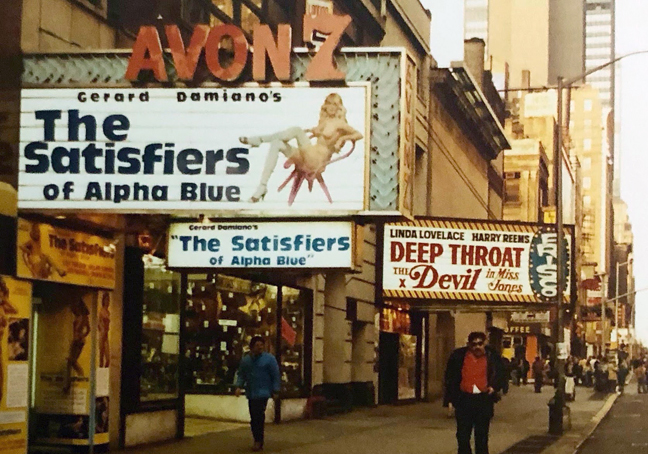

An intelligent, sober, detailed account of an important case.
Complex for sure, but this account shows all sides’ perspectives in a detailed way.
R.I.P. Ruby – you will be remembered.
I knew the outline of this story but as usual The Rialto Report brings deep layers of detail and understanding to it…. and makes me grateful that something like TRR exists. It’s very special.
Every week I continue to be in awe of what the Rialto comes up with – an amazing film and cultural resource.
Amazing! Beautiful piece here, WOW!
The Rise Golden Age Of Meese Commission From 1986 To 1993 Keep Up Good Work
A new RR Avon chapter. Hold all my calls.
Another gem from your site.i should be used to it by now though. I look forward to the next installment.
The Meese Commission was responsible for cutting all those classics on VHS in the late 80s, early 90s. Films that were 80 minutes long suddenly were cut to say 60 minutes, with Raw Talent (1984) probably the worst hack job I’ve seen yet, with a good 30 minutes cut from it.
And few of those golden age classics have been restored to their original playing times, yet.
…. says Donny, who clearly didn’t read this excellent article and realize that it had nothing to do with the Meese Commission.
Holy pants, RR, you’ve done it again!
‘a collection of movies so reprehensible that the L.A.P.D. claimed that people would throw up after seeing them.’
Shouldn’t that be throwing up while watching them?
Fun fact: TL’s ‘Penthouse’ layout is in the same issue with the Vanessa Williams pics.
My father had that issue of Penthouse, tucked away on a high shelf. I knew about it, although I had no idea at the time that the young woman in the pictorial (something about sex in an elevator, I believe) was Lords.
It was his possession of that issue that my mother’s divorce attorney used to leverage a huge settlement for her. (Probably helped that I’d taken a photograph of the cover and a photo of the shelf on which it was hidden and my sworn testimony that I had found what I now knew was child pornography.)
That magazine disappeared after the divorce. So did he.
‘(something about sex in an elevator, I believe) ‘
Actually, that was a slightly later set, out of the Suze factory.
Randall got good use from that elevator, as it’s the showcase in her ‘Love Bites’ film.
Author’s own opinion: Suze’s “films” are terrible…but she’s admitted as such : “you have to edit them, and everything”. Really, what a shocker! 😉
I saw that issue for sale, tucked away in a bin with dozens of other men’s magazines of that era, at a flea market a couple of years ago. An overzealous cop with knowledge of what that issue was all about could have really ruined the seller’s life. I almost said something, but I was with someone who is better off not knowing that I know that.
As per usual you are THE BEST!, Always great to read more stuff on Avon, hats off to April and Ashley!
As usual, your work was terrific! I always look forward to RR
Interesting and informative article and well written as expected. I never cared for Traci Lords nor had any respect for anyone who knowingly commits a crime that involves others. In her case many films were pulled and had to be edited and many lost revenue. She really used that unfortunate situation to her advantage, case and point “Traci I Love You” which never saw as I refused to contribute my hard earned money for her gain. The 80’s was my favorite decade for adult cinema and her story as well as John Holmes were that decade’s lowest points.